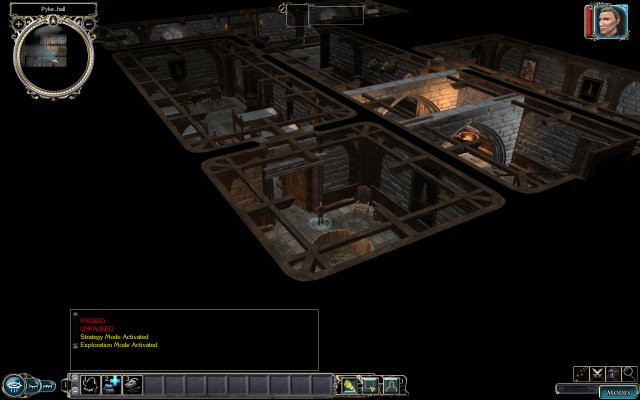Robert Baratheon |
| World of Westeros - People | |||
| Tuesday, 22 July 2008 17:07 | |||
|
(King) 14th Level (Man-at-arms 4 / Noble 5 / Commander 3 / Knight 2) - Deceased Robert groaned with good humoured impatience. “If I wanted to honour you, I’d let you retire. I am planning to make you run the kingdom and fight the wars while I eat and drink and wench myself into an early grave.” He slapped his gut and grinned. “You know the saying about the king and his Hand?...I bedded a fishwife once who told me the lowborn have a choicer way to put it. The king eats, they say, and the Hand takes the shit.” He threw back his head and roared his laughter.
It is said that Orys Baratheon, founder of the House of the Stag, was the bastard sibling of Aegon the Dragon himself. Orys won his family the motto, “Ours is the Fury,” taken along with the lands, dominion, and bloodline of Argilac, last of the Storm Kings. Thus, House Baratheon grew and rose to prominence. In recent times, Baratheon and Targaryen wed again, but Robert’s main claim to the throne was his hammer. Neither a near legendary bastard link, nor ancient weddings between Baratheon and Targaryen form an impressive foundation for a royal dynasty. It was Robert for whom the rebels fought, not his pedigree. If King Aerys had not become a threat to his subjects, the issue may never have arisen. Robert claims to have only wanted Lyanna back, but was presumably urged to put himself forward for the crown. Robert saw his chance and was enough of an opportunist to try for the ultimate prize, driven by his fury towards the Targaryens. He made the right friends, fought the right battles, and won. Winning is not always good for warriors. The man who sits on the Iron Throne is no longer Robert Baratheon, the warrior. The hero of a hundred battles and perhaps as many bedchambers exists no more. The Targaryens could not kill the usurper, but the Iron Throne finished him in a far crueller way. Robert has become a joke, a bloated travesty of himself, puffi ng when he walks and red-faced from too much food and wine. Once thesmell of leather armour and hard work followed the man. Now the sweat pouring from beneath his silks is partially disguised by the reek of perfume. Both destiny and ambition determined that Robert would attempt the transition from heroic warrior to father of his country, from fighter to governor. The price, however was too high for him to pay. The transformation proved beyond Robert’s ability. He could never stomach dull responsibilities. In response, he ate, drank, and celebrated, while the small matter of running the kingdom passed him by and slowly but surely fell into the hands of another. Robert is not a fool, but he avoids thinking too deeply. As an example, one need only look at the people with whom he has surrounded himself. Robert’s queen is a Lannister. Robert’s page is a Lannister. Robert’s squires, Lancel and Tyrek, are Lannisters. The Warden of the West is Tywin Lannister, and Robert gives the wardenship of the East to Jaime. His good times are inevitably expensive, and he wants to enjoy his tourneys and his wine, his hunts and his feasts without having to worry about the money or its source. The crown goes to the Iron Bank of Braavos and the Faith for funds, but even that is not enough. Robert has borrowed from Highgarden as well, but there is only one family with suffi ciently deep pockets to bankroll Baratheon’s pleasures: the Lannisters of Casterly Rock. Robert’s crown is deeply in debt to Tywin Lannister. For all his bluff and roar, Robert literally cannot afford to antagonise his wife’s family. In most arguments with Cersei, he will tell her bluntly to be silent, but if she kicks up enough fuss, he concedes; the senseless death of Sansa’s wolf is a prime example. To him, it is a small price to pay. Without Lannister resources, Robert could not afford to ignore the dull but important economic aspect of rulership, so Tywin pays and the Lannisters grow ever more numerous, clustering around the king for titles, land, and power. Only a fool could fail to see where this is going. A stag surrounded by lions is a story with a predictable ending. Robert’s failure as a king is echoed in his failure as a father and husband. He complains about the coldness of Queen Cersei, but never questions the part he plays in chilling her heart. Coming to bed drunk and desirous of a dead woman is hardly Lusty and sensual, Robert has prodigious physical appetites and no shortage of willing partners. He uses his concubines and then abandons them, albeit with a good natured smile. It is a curious thing that with his mistresses Robert seems to regain some Robert has several healthy, intelligent children who could be fine defenders of his throne, but his seed will fail because Robert avoids responsibility toward his charges, be they his children or his realm. This is most evident in his relationship with Joffrey. Robert is very aware that his heir is unsuitable for the crown but does nothing to improve the situation. Perhaps Joffrey is beyond improvement, but it is Robert’s duty to try. Instead, he leaves his son to Cersei’s idea of training, and virtually never speaks to the boy. It bodes ill for his kingdom and Robert knows it, but his need for diversion far outweighs his ability to cope with and address his shortcomings. Robert the warrior was a fierce but generous man. At the war’s end, he spared those followers of Aerys who swore fealty to him, an act of mercy that won him many loyal supporters. He could never let go of his hatred for the Targaryens themselves, however. Toppling their house and rule was not enough for his undying hatred. Now he plots the assassination of the pregnant Daenerys Targaryen because her unborn child might one day threaten his bloodline. He has become a politician at the cost of the warrior’s instinct to deal with the most deadly foe first. He can see a potential enemy decades away and far beyond his shores, but ignores the very real immediate threat at home — possibly because that threat is paying his bills. Among the Seven, the Father is worshipped as a giver of laws and an example of wise rulership. If anything, Robert demonstrates a shadow side to the Father: an authoritarian boor, dedicated to pleasing himself while other people pay the price. Wined and dined too long on Lannister gold, It may be that Lyanna’s death was the beginning of Robert’s ruin. When he comes to Winterfell, the first thing he does is pay his respects to her remains. Eddard Stark’s dead sister is still his dream of the perfect love, the highest ideal to which he could aspire. Robert was certain that Rhaegar had brutally raped her after kidnapping her, and this drove him into the throes of battle-rage; he killed Prince Rhaegar not for his crown, but to avenge her loss. Rhaegar paid the price for Lyanna on the shores of the Trident, leaving Robert victory but no peace. It could be said that after losing the most precious hope of his life, nothing remained for him but to gain a kingdom and drink deep. More cynical observers might say the deep drinking would have happened even Despite his failings, Robert has his good qualities. He is a simple man who lives life to the fullest, and he can be a lot of fun to have around. Curiously, for a man who cannot bear to be contradicted, he respects the unbending honesty of Eddard Stark enough to make him his Hand. His love has a huge element of selfishness, however; in many ways, Robert has the emotions of a child, and a child is incapable of putting the welfare of others before himself. The Hand rules in the King’s name and the King enjoys himself. This is what Robert is trying to find again: the freedom of his youth. He needs more than all the luxuries a court can throw at a jaded monarch. He needs the thrill of a new beginning, and only half-jokes when he suggests to Eddard that they take off again, ride into a new sunrise, find new adventures ... in short, that they stop being fathers and rulers and become warriors again. It is too late, however, and they both know it. Only as he lies dying does the true Robert re-emerge, rescinding the order to kill Daenerys. He asks Eddard to protect his children and his realm, to be the father Robert never was. Robert Baratheon dies as he lived at his best, killing the foe that rips through Known Bastards Although Robert Baratheon is known to have fathered sixteen bastards, only one has been acknowledged. Five have been seen by notable characters, while two others have been mentioned only in passing.
|
|||
| Last Updated on Wednesday, 13 April 2011 21:34 |





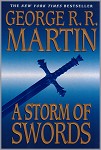
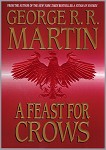












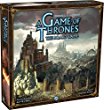

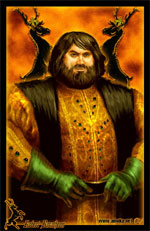 In his days as a warrior, Robert Baratheon was unmistakeable. A tall, strapping, well-muscled brawler, with his hearty smile and heart-stopping blue eyes, he had no lack of loyal friends. The ladies fell before his charms, the men-at-arms admired him, and few could deny that Robert Baratheon was everything a young king should be. In those days, Robert had more than just prowess on the battlefi eld and a genial attitude away from it. He had charisma — a quality just as important as his skill with a sword, for the Baratheon claim to the Iron Throne was slender at best.
In his days as a warrior, Robert Baratheon was unmistakeable. A tall, strapping, well-muscled brawler, with his hearty smile and heart-stopping blue eyes, he had no lack of loyal friends. The ladies fell before his charms, the men-at-arms admired him, and few could deny that Robert Baratheon was everything a young king should be. In those days, Robert had more than just prowess on the battlefi eld and a genial attitude away from it. He had charisma — a quality just as important as his skill with a sword, for the Baratheon claim to the Iron Throne was slender at best.